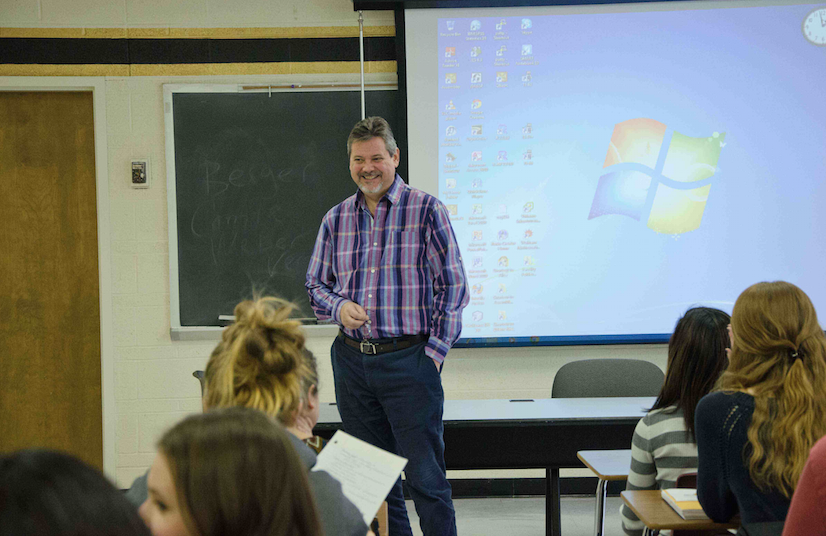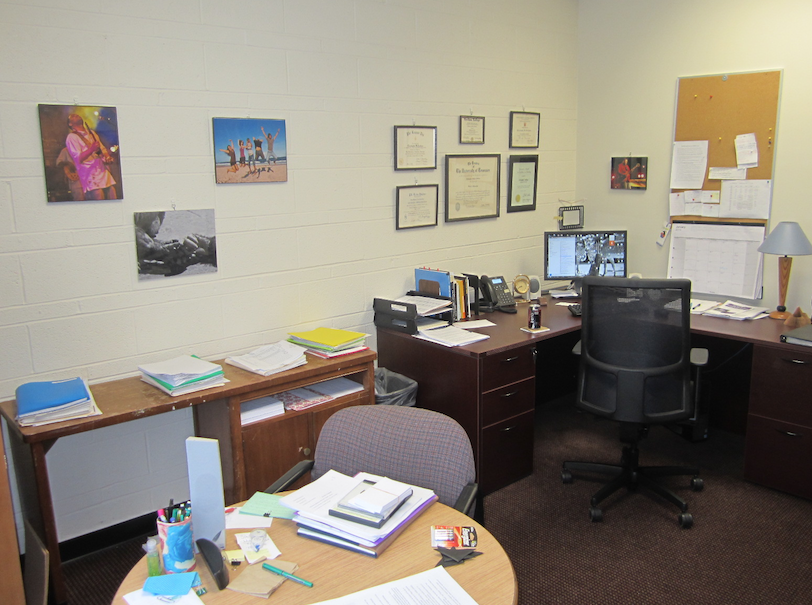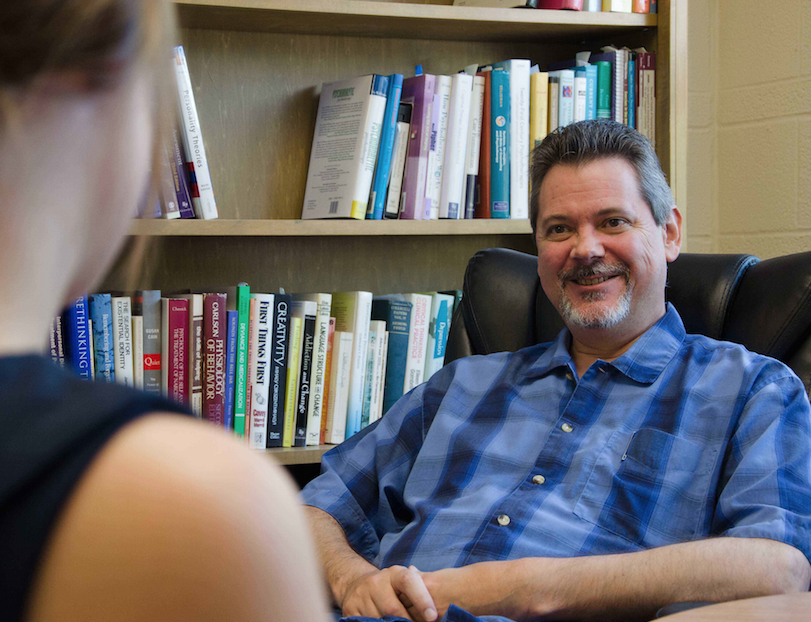 Background questions
Background questions
I teach at Lindenwood University, a medium-size liberal arts university in St. Charles, MO, just outside of St. Louis.
My classes include Abnormal Psychology, Personality, Psychotherapy, Critical & Creative Thinking, and various occasional Special Topics courses in the area of psychopathology (to date, this has included courses on Depression, Personality Disorders, and “Madness”).
What's the best advice about teaching you've ever received?
I kind of backed into teaching, transitioning from 11 years of clinical practice to adjunct teaching, to full-time teaching. I don’t really recall any seminal advice I received about teaching, as I never had a formal mentor or guide who prepared me to be a teacher. Of course, once I started doing it I cultivated valuable relationships with more senior colleagues, but the advice they shared with me was mostly about small, day-to-day matters related to grading, managing the classroom, etc.
What feels like the strongest “shaping influence” was the model presented by my major professor in my own undergraduate days – Dale Noyd, a man who taught with great passion, humor, and incisiveness. I seek to emulate him each time I step into my own classroom.
What book or article has shaped your work as a psychology teacher?
If I had to pick one book that has shaped my work, it would be Jerome Frank’s Persuasion and Healing. It’s about psychotherapy, but also about so much more – what with its cross-cultural emphasis (before this was fashionable), its wide-ranging exploration of “healing traditions,” its relentlessly broad perspective, and its effort to cut across discordant theoretical schools in search of what unites them all.
Tell us about your favorite lecture topic or course to teach.
My favorite course to teach is ABNORMAL PSYCHOLOGY (and various special topic courses derived from it). In this course I relish the opportunity to capture students’ interest, stoke it further, and to challenge the unfortunately numerous misconceptions about this field that are widely held. I also like being able to extend beyond the “disorders” themselves and explore how they can serve as inroads to fascinating topics like: What is “normal”? How much influence does culture exert on people’s behaviors and perceptions? How do “mind” and “body” interact with each other? How does “different” get transformed into “undesired”? What challenging things happen at the intersection of science, marketing, and mass media?
What teaching and learning techniques work best for you? (quizzes? homework? take home exams?)
Concerning teaching/learning techniques, my favorite is unquestionably discussion. I like to engage students face-to-face, respond to them in individualized ways, and facilitate their engagement of each other. I get to know the students, their ways of thinking and their ways of expressing themselves. My favorite move in discussions is to relentlessly adopt a “devil’s advocate” position, prodding students to think more deeply as they seek to support or justify their perspective on the material under discussion. I always did this when I was a student, and it feels very natural to continue it in my role as instructor (which, of course, is simultaneously a role as student).
I recently took an online course, with online feedback given/received, and “discussions” conducted solely through the keyboard – and I pretty much hated it!
 What's your workspace like?
What's your workspace like?
I’m notorious for having music playing constantly in my office – it energizes me and helps me focus, especially when I’m doing routine or mundane things (for serious writing, the music goes off). It’s fun to perplex my students with my eclectic tastes – ranging from electric Chicago blues to bebop jazz to 1940s R&B to 1970s soul to modern hip-hop.
My walls (in my office as well as in my home) display numerous of my photographs – having them around me reminds me that I can be creative, and they make me feel centered and “at-home” with my creativity when I’m at work.
I make a point of arranging my office such that I can engage students with no desk between us. It might be a holdover from my days as a clinician. Most of my colleagues have a desk between them and students who come in to talk.
For grading and/or extended reading of books or papers, I have a second rolling chair that I position near my large windows; they afford me lots of natural light (I often turn the electric lights off in my office; I find dim environments soothing), and some fresh air when the weather allows it.
Three words that best describe your teaching style.
My teaching style is often described as PASSIONATE, HUMOROUS, and ENGAGING.
What is your teaching philosophy in 8 words or fewer?
My short, punchy teaching philosophy? Engage them, intrigue them, and strike a spark that blows their minds open. I realize that’s more than eight words, but it’s in keeping with the notion of broadening rather than confining!
Tell us about a teaching disaster (or embarrassment) you've had.
My teaching disaster happened this past semester. I distributed a multiple choice exam to my Abnormal Psychology class, and two-thirds of the way through the exam a conscientious student came up to tell me that her exam had the answer key printed on the back of the final page of questions. Soon thereafter, another student approached me to deliver the same quiet message. I then realized that every question packet probably had a copy of the answer key on the back of the last page. I quickly announced this to the class and asked them not to peek at the back of that page as they finished their exams. I told them this was an excellent opportunity to demonstrate their academic integrity. I later graded the exams, fully expecting that I’d have to re-administer it – but found that the grade distribution for the exam was similar to what I’d seen previously with this version of the exam, and there were no astonishingly-high scores. The next class period I apologized to the students for my error, confessed my embarrassment, and told them I was impressed that they apparently had behaved honestly. Several students then volunteered comments like “when I noticed there were answers on there, I just assumed it was some sort of psychological experiment you were doing on us …”. I do occasionally use dissimulation in small ways in my classes, so I guess this is understandable.
What is something your students would be surprised to learn about you?
One thing my students would be surprised to learn about me is that I’m a published writer of satire, humor, and light verse, and that I’m taking coursework toward a MFA in Creative Writing.
 What are you currently reading for pleasure?
What are you currently reading for pleasure?
I don’t really “read for pleasure,” unless reading academic books counts. I read a LOT in my job, and reading is often the last thing I want to spend leisure time on. Having said that, I am constantly reading new releases within my fields of interest, always looking for new and fresh material for classes, and new prospective texts for classes. I have one full shelf of recently-published books in my areas of interest that I’m slowly making my way through.
What tech tool could you not live without?
At the risk of sounding like the old fogey I’ve apparently become, I’d cite e-mail as my indispensable “tech tool.” I LOVE e-mail as a method of communication with students (second only to face-to-face contact). I HATE talking on the phone, and I find that phone calls can be intrusive (whether making them or receiving them) – but I can respond to e-mails when the time is right for me, and so can recipients of my messages. I also like having an electronic paper trail of communications with students and administrators. Lastly, I am an e-mail pack-rat, archiving messages indefinitely. There have been probably a half-dozen occasions when I was able to retrieve some important bit of information by pulling up an old e-mail from last month or last year …
